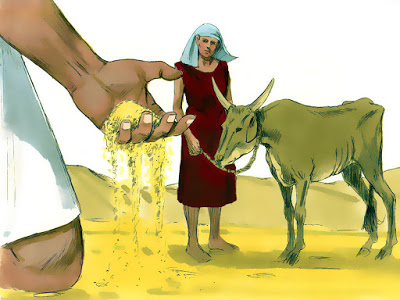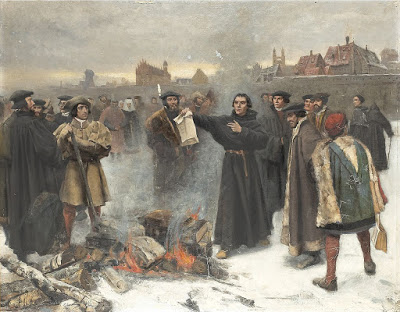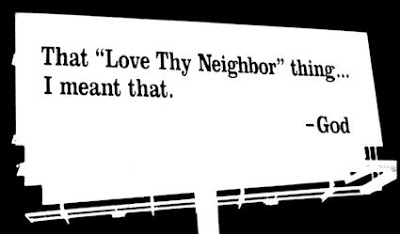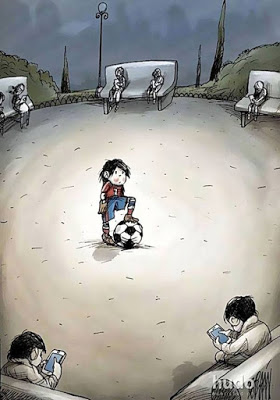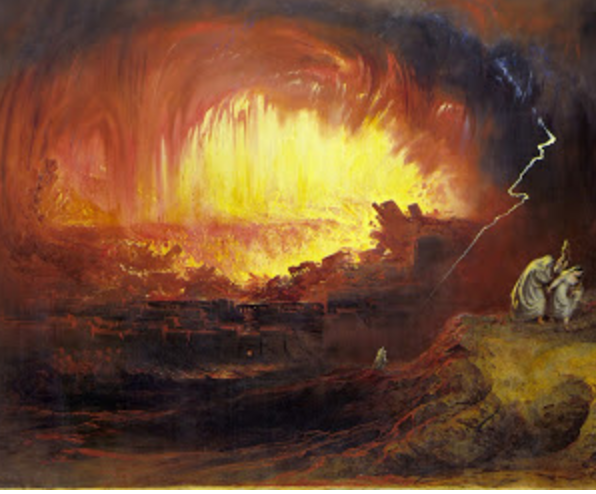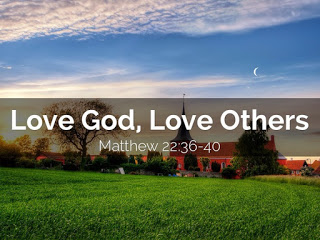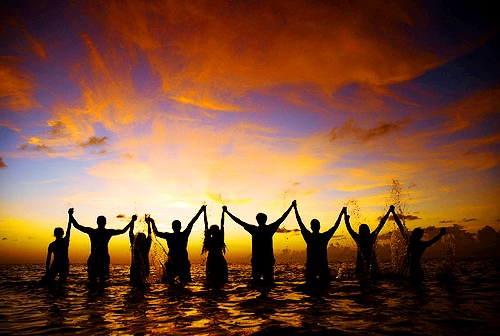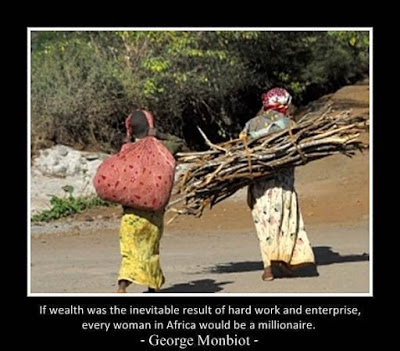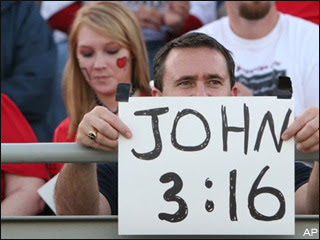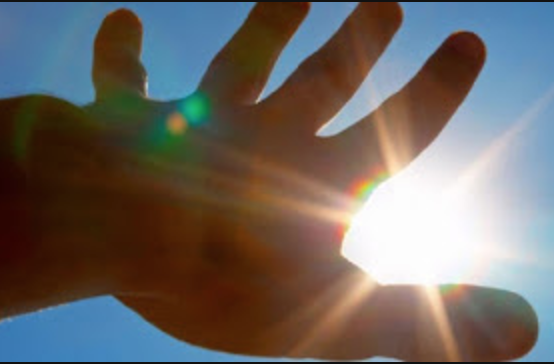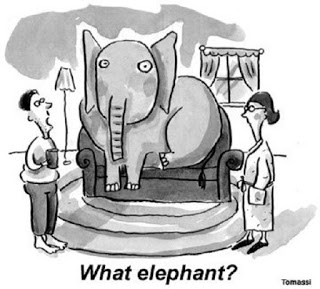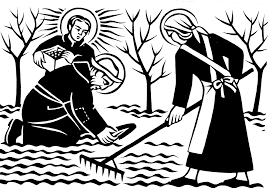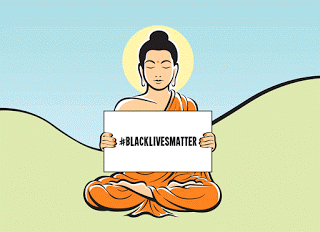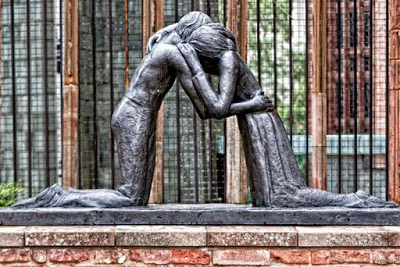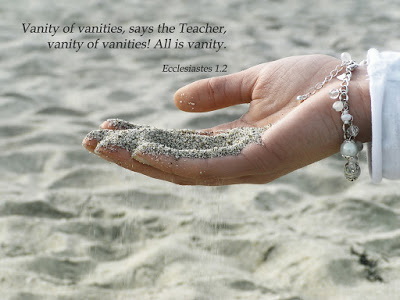Due to a drought, Jacob's family fled to Egypt. They got the permission of the Pharaoh to do this. That's wonderful. However, what would Jacob's family have done if the Pharaoh did not grant this permission and give the equivalent of a "green card"? They would be faced with a tough choice—either watch their family and flocks die in the drought or escape into Egypt without permission. Every responsible father would do the right thing and break a law instead of watch his family die. You would do it. I would do it. And we would be called heroes, not criminals. This more accurately captures the situation of undocumented immigrants in the USA today. If the Pharaoh (i.e. US government) does not grant permission, the one who commits the sin is NOT the undocumented immigrant trying to feed his family—the one who commits the sin is the one who denies permission.
This is an especially difficult concept for us in the United States. Many of the people who helped form this country tried to solve their problems by simply moving away from people they had difficulties with. This method of dealing with problems is deeply embedded in the American psyche. When people get on your nerves, you can simply "go west" to get a little peace and quiet, a little piece of your own ground, and live with minimal interactions with neighbors. You don't have to learn to live with difficult people, rather you can just pick the people you want to be with. People first left the problems of Europe behind. When life here got too tense, many continued pioneering westward to get away from everyone. Part of the American Dream is the illusion that you can create and control the bubble you live in. Perhaps this method worked for a couple hundred years until the empty spaces ran out and we were stuck staring eyeball to eyeball with our neighbors, again. Still, the fantasy remains that the individual acting alone is the most advanced and enlightened form of human activity. Yet Christianity has always held that life is about "we" not about "me."
History can be a tough teacher for all of us. The Protestant Reformation has had its dark side. We could all easily look at the specks in each others' eyes while neglecting the boulders in our own. Every church denomination has manifested the full range of human failings. Yes, the Reformers broke new and important ground that has enriched all of us; they also re-discovered many of the same sins all over again and perhaps generated new problems that were not there before. Every new moment begins with freshness and purity. After a while, we see the same old corruption, prejudice, appeals to power, gravitation toward money and political posturing creep into it. The act of reformation has to be ongoing.
It is perfectly understandable that we will fall short of what the Gospel demands of us. But is it really understandable that so many of us fall short so easily?
What's on TV Tonight? Posted: 05 Jan 2017 09:17 AM PST A scene depicting an American heartland barn dance by William Medcalf I didn't intend to write a series on smart phones and social media. This is a blog about spirituality, religious harmony and related topics, after all. I try to keep on topic. However, given the tumultuous 2016 presidential election, many people have been rethinking how we use these new technologies. Does it serve our faith life? Does it improve our culture and society? Is this really the best way to evangelize? One thing led to another. I stumbled upon some thoughts that have been sitting with me a long time.
Part 5 of the series, What Makes a Christian?
When Jesus said, "The last shall be first and the first shall be last," I highly doubt He meant that the first and Greatest Commandment should be the last thing on our list of things to do.
You can complain that young kids are constantly attached to their smart phones. But you might be better served asking why their lives are so deprived of human interaction that they have been sucked into the internet so strongly. Drive through most US suburbs, cities and small towns, you won't see kids playing in the yards, families talking on porches or town folk gathering for public entertainment. This is completely antithetical to how humans have always lived. Children grow up desperately lonely and disconnected from others. Along comes the internet and suddenly they can be plugged in to people all over. Can we blame them? Then yes, over time, they lose (or never develop) the skills at interpersonal interaction.
We've been robbed of the power of the story of Sodom. It should be a strong companion to Matthew 25:31-46, which also gives dire warnings for those who do not serve Jesus by feeding the hungry, welcoming the stranger and the other Works of Mercy. It's a path that ends in destruction.
Part 4 of the series, What Makes a Christian?
Sometimes our greatest breach with Scripture is not when we outright contradict it--it's what we choose to prioritize, diminish or outright ignore. There is a time for everything under heaven (Ecclesiastes 3:1). We need to put first things first and second things second. Much of Christianity focuses on salvation plans and doctrinal ideas.
This picture has been going viral lately. It is easy to draw conclusions from it. You see a homeless man with a sign asking for money. Standing next to him is a Wal-Mart employee with a "Hiring" sign. The Wal-Mart employee is looking right at the homeless man (as if to invite him to apply), but the homeless man is not looking at the Wal-Mart employee.
To church leaders, I say this: Be brave enough to be yourself. Trust in the dignity in which God has created you. Be whatever you are--nerdy, goofy, quirky, young or old, plain or complex. Don't be trendy. You don't have to know the latest catch phrases or technology. Just be you. That's all that you can ever give, and honestly, that's all that anyone ever really wants.
We know, deep down in our being, that we are all connected. We have this fundamental knowledge. It's instinctive. It's just something that is just known in the universe. We know all humans are brothers and sisters. It follows that we have a responsibility to each other that stems from that relationship. When we see someone suffering, we instinctively feel it, too. We know they are a part of us. We feel their pain, too. Their pain is our pain. Despite the unjust world we see before us, with its patterns of death, decay and misery, in ways we are at a total loss to explain, despite all evidence to the contrary, we know deep in our bones that nobody wins unless everybody wins, and that this is a fundamental law written into the very fabric of the universe.
Part 3 of the series, What Makes a Christian?
John 3:16 is a beautiful verse, understood this way--that God's act of sharing Jesus with us comes out of love, and that all who participate in that love through loving both God and one another follow in the Way of Jesus, which is the Way of eternity--to love Jesus so much that you imitate Him and follow His Way. To believe in His message so much that you follow it.
Part 2 in Series: What Makes A Christian?
It is amazing how often we fail a most basic mark of the faith. It is a downright scandal how rarely it is preached. It's questionable how directly our religious and moral practices stem from it. Yet if we believe the direct words of Jesus Himself--you know, God--the very ability of others to recognize our Christian identity is dependent on how we follow this. We gather in churches. We have elaborate worship and praise. And yet we barely give lip service to the first and foremost of the commandments. When we do, it is often to give exceptions--No, Jesus didn't really mean that. . . I'm talking about the Greatest Commandment--love God and love neighbor. Abundantly.
Part 1 of the series, What Makes a Christian?
In John 13:34-35, Jesus states that our very public witness of our Christian identity itself depends on whether or not we love one another. Otherwise, people will not recognize that we are indeed Christians. Jesus tells us to follow his example. Jesus not only gives the commandment to love, but also states that His life has modeled this love.
There is a lot of debate about raising the minimum wage. The fight for $15 movement is going strong and has gained footing in a number of regions in the USA. People are debating the merits from both sides. However, there is one line of reasoning that I have not heard anyone else make, and it is significant. It is probably missed because it is so obvious that it's right in front of our eyes. Even better, you do not need a degree in economics to understand it.
We invite you to join us in a virtual (but real) social media prayer and meditation. We'd like you to get comfortable
This is going to be one of those stories where the names and locations are kept anonymous to protect privacy. When it comes to racial and religious reconciliation, all too often the most heartfelt stories are also the most confidential. It is a story that needs to be told, though. I will do my best to share the light and protect all parties.
Jesus seemed to treat everyone who crossed his path with the same respect and dignity. I find this to be one of the most amazing things about his earthly ministry. It didn't matter if someone were rich or poor. Jesus seemed equally willing to be scandalized by hanging out both with "sinners" and tax collectors (I put "sinners" in quotes because maybe the Bible was recording the public chatter, and "sinners" was really another word for "outcasts"). Jesus developed quite a reputation for himself for doing this. Jesus could still be tough on people. He could still get angry. But he never seemed to lose sight of that basic, God-given dignity of every person.
In the Gospels, Jesus is continually calling on us to discern between what is eternal and what is not. Jesus calls us to let go and be not afraid. He tells us that there is reason to hope in this, even if--or maybe especially if--we hang onto hope by the skin of our calloused fingertips with our last bit of strength. He tell us that what is lasting is not of this world--it is of the Kingdom. All worldly pursuits, all riches, even the emotional "riches" of pride--maybe especially so--come from dust and return to dust. At best they are meaningless, at worst they are distractions that keep us from finding true meaning.
When people think about being more environmentally responsible, the first topics that come to mind usually involve transportation habits, utilities usage and food consumption. These are all very important. However, there is another area that we often overlook: Clothing. Almost every decision we make about clothing can have an impact on other people as well as on the earth we all share. In honor of the World Day of Prayer for the Care of Creation, I offer the following. These are all very practical suggestions, but they can also be a gateway to a deeper spiritual exploration. See in these tips a nudge to focus, simplify, contemplate and rest. They can help us tune in better to our relationship with the earth and with our fellow humans.

